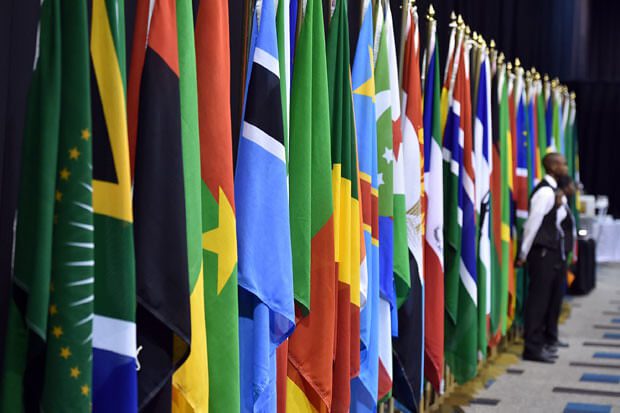I was supposed to be giving a presentation on this subject as part of a panel organized by Economists for Peace and Security at the American Economic Association conference in Philadelphia last Saturday. Winter Storm Grayson put paid to that plan, so instead I thought I’d write about it here.
Any discussion of this question cannot ignore the “elephant in the room” of Trump’s mental stability or lack thereof, and the fear that this could lead to him launching a catastrophic war in a fit of rage. One wishes one could completely discount this, and I hope that it remains a very low probability scenario. But aside from this apocalyptic, and utterly unpredictable possibility, there are many aspects of Trump’s foreign, security, and war-fighting policies so far that can be considered.
Before considering specific situations and policies, there are a number of themes and tendencies in Trump (and his Administration’s) policies that can be identified.
First, uncertainty and unpredictability. This partly relates to Trump’s temperament, his restless Twitter finger and unfiltered, ill-considered speech, but also the contradictions within the Administration – the fact that Secretary of State Rex Tillerson often seems to be pursuing a policy 180 degrees at odds with that of his boss. Which is the actual policy? Sometimes, as with North Korea, it looks like Tillerson is being firmly put in his place, his suggestions of negotiations between the US and the DPRK quickly squashed. At other times, as with Qatar, where Trump appeared to endorse the Saudi/UAE-led blockade and accusations of Qatari support for terrorism, it seems more that Tillerson and the rest of the Administration have been cleaning up after Trump’s mess.
Trump also on occasions exhibits strong emotional reactions when confronted with images of civilian suffering. This can lead to dangerous responses, such as the missile attack on Syria following fresh chemical weapon attacks by the Assad regime, which fortunately proved to be a one-off, and did not turn into any wider confrontation with the regime and its Russian backers; more recently his unusually strong call for Saudi Arabia and UAE to allow supplies through to besieged Yemen was a more positive result of this tendency. Such reactions however appear to be sporadic and idiosyncratic, not linked to any thought-out policy or strategy.
Some IR theorists may argue that such unpredictability can be an advantage, in terms of deterring aggressive actions by opponents, who may fear an excessive and irrational response – the so-called ‘madman theory’ of Richard Nixon. North Korea applies this strategy masterfully: their blood-curdling rhetoric promising merciless destruction of the enemy seems ridiculous, but generates caution on the part of the US and South Korea towards even limited military action: might even a minor, punitive air strike against certain targets lead to an all-out North Korean response, even though this would certainly lead to the doom of the regime?
But for the United States in the current global context, this hardly seems to apply. Rather, Trump’s ‘fire and fury’ rhetoric might lead North Korea to take an even more paranoid, hair-trigger approach, seeing the beginnings of an attack in military exercises, for example. On the other hand, Trump’s egging on of Crown Prince Mohammed bin Salman (better known as MBS) in Saudi Arabia, though contradicted at times by the rest of the Administration, certainly seems to have encouraged the Kingdom’s reckless actions in the region (further discussed below). Saddam Hussein in 1990 may have misinterpreted the words of the US Ambassador to Iraq as being tacit authorization for the invasion of Kuwait; there is a real danger that a loose Tweet by Trump, that does not actually represent any firm US policy, might encourage even more reckless actions by MBS or other US allies.
In considering the impact of Trump’s temperament, the importance of his tweets and other ill-thought-out, headline-grabbing, public statements should not be overstated; most foreign leaders have probably learnt to discount these. Rather, the problem has to do with a) the perception (and likely reality) of an erratic and unstable President, which may influence US adversaries’ threat perceptions, increasing the risk of miscalculation, and the fact that, if the President’s public statements are not always to be taken as Administration policy, the question of who is actually forming policy becomes confused.
A second theme is his individualized approach to international relations, as exemplified by his claim that “I am the only one who matters” in terms of US diplomacy (as the State Department is hollowed out, with large numbers of Ambassadorial and other key diplomatic posts unfilled). Probably the best example of this is his enthusiastic support for MBS, who seems to have become BFFs with Trump’s son-in-law Jared Kushner. Indeed, Trump’s person-to-person and family-to-family approach probably chimes very well with the Saudi way of doing things. In the “small mercies” column, Trump’s fawning admiration of China’s President Xi Jing Ping might have reduced the chances of a serious superpower confrontation, given Trump’s pre-election lambasting of China.
Other themes that emerge include a desire to erase President Obama’s legacy in every sphere possible, a disdain (typical of the contemporary Republican Party) for international norms and institutions, and a lack of even pretended concern for human rights (such as his endorsement of Philippines President Duterte’s murderous ‘war on drugs’).
A cumulative impact of these Trumpian tendencies has been, as widely noted, a diminution of US influence in the world, in particular a weakening of the alliances that have always helped amplify the impact of US security policies. The extent to which this is harmful to international security more broadly will depend partly upon how one views the balance, benign and malign, of the impact of US security policies on the world.
Having set out these general themes that characterize Trump’s approach, I present a brief survey, first of some of the key global issue areas where the security impact of Trump’s policies has been most felt; and secondly (in part II), on some of the key areas of regional tension and conflict where Trump has had a significant—and mostly harmful—impact.
Climate change: Human-induced global warming is widely seen—including by the US Department of Defense—as a major global security threat in decades to come, and even in the present day. While it is hard to identify any particular conflict as being “caused by climate change”, the economic and social stresses it engenders tend to exacerbate conflict risk factors. In the future, climate change may lead to major food and water shortages and massive refugee flows, all potential conflict drivers. A 2016 SIPRI report discusses some of the key issues of climate-related security risks. Thus, the Trump Administration’s rejection of climate science and according policy decisions pose a major threat to global security. The most public aspect of this is Trump’s withdrawal from the Paris Climate Accord (typical of his repudiation of anything connected to his predecessor, and disdain for multilateralism). However, this is arguably not the worst aspect. The accord does not in itself require any specific policies, and the shock of this action created a backlash that has in some ways galvanized world opinion on the urgency of action. Nicaragua and Syria, the only other remaining hold-outs, joined the agreement, while China and the EU are advancing their own cooperative efforts and leadership on the issue. Within the US, states, cities and businesses have insisted that they are still in the Paris agreement, regardless of the position of the Federal Government, have re-emphasized their own commitment to reducing carbon emissions, and are developing their own cooperative links with the rest of the world.
But the bad news is the moves at an executive level to reverse US efforts at carbon emission reduction, and dismantling of environmental regulations in general. In this, Scott Pruitt, Trump’s head of the Environmental Protection Agency, has been an enthusiastic collaborator alongside Presidential Executive Orders, as the Obama-era Clean Power plan has been abandoned, regulations on fossil fuel power plants have been torn up, pipelines have been approved, and coastal and Arctic oil drilling permitted. Discussion of climate change has been removed from government websites, and government scientists defunded and muffled from researching and speaking on the topic. (Although, surprisingly, an official US government report on the current state of climate science was allowed to be published in November). Not only does the Trump Administration reject the scientific consensus on anthropogenic climate change, but it appears to reject the very concept that the collective impact of individual and business activities—externalities in economic language—is something that should be addressed by government policy.
These policies have the potential for a disastrous impact on US carbon emissions, and four years of them—let alone, God forbid, eight—will make the possibility for humanity avoiding a catastrophic rise in temperatures more remote.
Arms sales: President Obama was an enthusiastic seller of US arms, setting a new record of $278 billion of orders over his 8-year term. This is one area where Trump is enthusiastically following his predecessor, with major deals announced with Saudi Arabia (although the $110 billion widely quoted is largely smoke and mirrors) and Qatar among many others. However, Trump has removed some of the few restraints imposed by Obama. This includes allowing the sale of precision-guided munitions to Saudi for use in their war in Yemen, a multi-billion dollar arms sale to Bahrain, previously put on hold due to human rights concerns, and the sale of Super Tucano trainer/light combat aircraft to Nigeria, in spite of both human rights and corruption concerns. This is hardly a radical departure, however, as US restraint on arms sales on such grounds has always been highly selective.
Civilian casualties: Civilian casualties caused by US air strikes in the war against ISIS in Iraq and Syria have soared under the Trump administration. This may be in part due to the higher intensity of fighting, as ISIS have been driven from their major urban strongholds of Mosul and Raqqa, but is also almost certainly linked to a loosening of targeting rules by Trump, including a delegation of final targeting decisions down to field commanders. Moreover, the US has reversed a policy, announced in 2008 and due to take effect in 2018, which would have ended the use of cluster munitions with a failure rate of greater than 1%. Now, the army will be able to use up existing stocks of older, less reliable cluster munitions, in spite of the severe danger to civilians caused by such weapons.
Corruption and destabilizing financial flows: Corruption is a major source of insecurity and conflict, and in particular, the misappropriation of natural resource revenues is frequently a source of funding for destabilizing arms build-ups by both state and non-state actors. The Trump Administration, as well as Congressional Republicans, have made several steps backward in this regard.
First of all, by undoing the Cardin-Lugar provision, section 1504 of the 2010 Dodd-Frank financial reform bill, requiring oil, gas, and mining companies to report their payments to governments. In February 2017, Republicans in Congress, with Trump’s Presidential sign-off, used the Congressional Review Act (which can be passed with a simple majority in Senate) to overturn a 2016 SEC rule that would have finally implemented Cardin-Lugar. More recently, in December, the House Financial Services Committee voted to advance a bill that would repeal the Cardin-Lugar provision altogether. Secondly, also in December, Trump withdrew the US from the Extractive Industries Transparency Initiative, an international initiative promoting transparency in payments to governments by extractive companies.
Continue to part II

